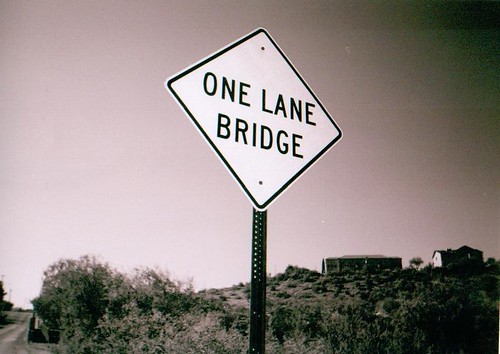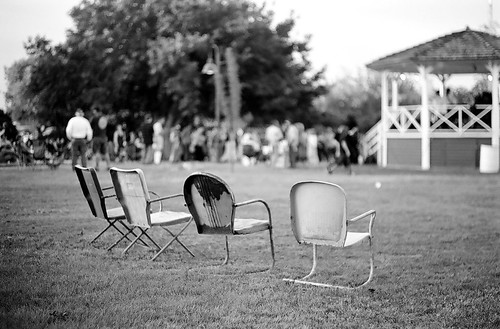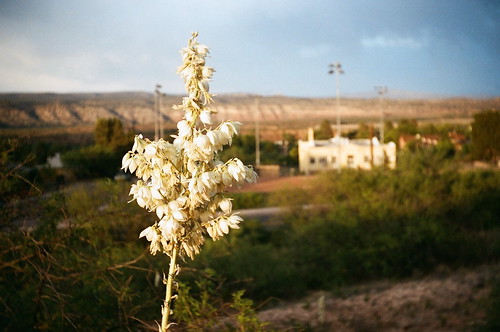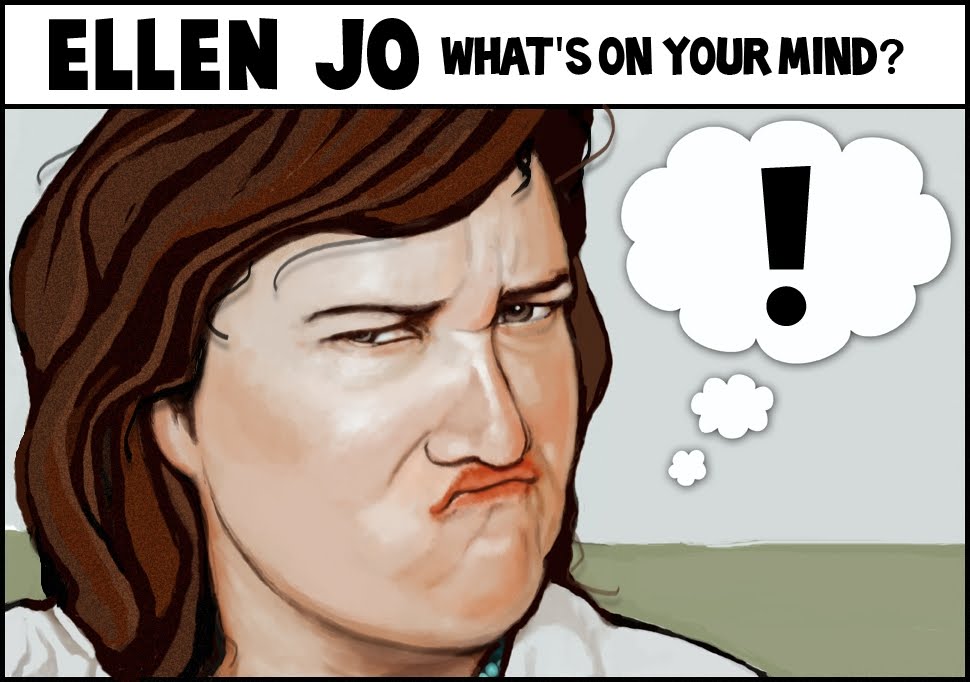May 2009 Outs
The Noise
Ellen Jo Roberts

I live a small life in a small town. This is not to say I don’t have big ideas, larger than life friends, and huge adventures. It also doesn’t mean I’m small-minded, uptight, or xenophobic. I just live in a small place. Very small. So small that it is sometimes absent from abbreviated maps. And my life is just as small, because I both live and work here, in Clarkdale, a historic “company town” that never outgrew its waistband much. Surrounded by wilderness, and framed by vintage boulevards, I seldom have reason to leave.I savor the tiniest aspects of this small life. The random new wildflowers that appear in my yard. Lizards sunning themselves on the hot bricks of our house. A posse of javelina on my favorite running trail. Familiar faces and autos, folks waving and smiling as I walk my dogs up Main Street. The way the night air is scented with soap and static cling as I stroll past the laundromat, reminding me of a Mexican motel I stayed at once. The postmaster knows me by name, and remarks on the packages and letters I receive.

It’s remarkable to me how small and specific my life has become, because I grew up in the biggest of places, a sprawling megopolis full of every technology, nationality, religion, commerce, and possibility. Any band you wanted to see, any fashion you wanted to buy, any type of food or beverage imaginable. World class art and science museums, prestigious schools, and an amazing network of public transportation and city services. It’s funny that I have almost none of that at my fingertips now, in my very small life. I grew up in the city of Chicago, a major urban area along the southwestern coast of Lake Michigan, named after the wild garlic that used to thrive along its marshy shores. I was a city kid, taking buses and trains, and hanging around downtown. My public high school had 4,000 kids (more than the population of the town where I now live). I lived there until my early 20s, prior to getting the itch for sunshine, big skies and wide open west.
Remember that ol’ Tex Avery cartoon, about the country wolf and the city wolf? They were cousins, those wolves, and they went to visit each other in each respective location. The country wolf was a total freak in the city, just completely overwhelmed by all the urban activity, while his city cousin was as cool as a cucumber. That is, until the city cousin got out to the country to visit and went completely bonkers himself, overwhelmed by the natural rural beauty (and a sexy rural she-wolf). I asked big city folk what they liked about the country, and asked small town folk what they missed about the big city. And vice versa. I got some very thoughtful and thought-provoking responses.Natasha Shealy, a much-beloved voice here at the Noise, moved from a rural western town--Cornville, Arizona -- to a rural eastern town, Marshall, North Carolina. She’s also lived an urban lifestyle in cities like Tucson, Los Angeles and San Francisco. Shealy takes her sultry big city swagger with her wherever she goes, captivating small communities with her energy. “I miss the exotic foods of the big city, the frenetic energy, the intellectual current”, she says, “In the city you can buy stainless steel trash-cans after 5pm. In the city men wear really tight pants.” (Shealy has this theory she is continually hashing out, about men in loose pants vs. men in tight pants, and what it means from a sociological standpoint. I’m not sure if we’ll ever fully find the answer.) “To quote a friend, I am a ‘small town-junkie’ and have lived in my share of charming one street towns ‘til I returned home to Marshall, North Carolina, which is hands-down tops for small towns across America. Old Town Cottonwood gets my vote for second coolest small town, for its proximity to the river, the naughty charm of Kactus Kate's, and the irreverent peacocks who have inspired many a late night poem”.
My brother Jim, a true city slicker who prides himself on never having lived more than 10 or 11 miles from Wrigley Field, thinks that I know everybody in the Verde Valley, and that folks here are, in general remarkably friendly to strangers. “The stars in the sky stand out a lot more in a remote small town, but I’ll gladly forego a few stars for access to an occasional 3:00am taco.” Accessibility to goods and services is definitely a common concern with city folk. They're accustomed to being able to get whatever they want whenever they want it, and are unsure how they'd deal with someplace where the sidewalks roll up at sunset.
Jeremy McReady was in my 3rd grade class. I'll always remember him as a freckle-faced trouble-maker with a twinkle in his eye. He now lives only about 6 miles from his childhood home. “I was born and raised in Chicago, but we used to take weekend trips to a small Michigan town," he said. "Some of my fondest memories are the ones of isolation and nature. The walks in the woods, the fishing, catching frogs, bonfires with family and friends. I always remember a feeling of dread when we would pack up, look for the cat, Winifred, and start the 3 hour trek back. When you drive back the radio stations change and the music seems more aggressive."
Clarkdale resident, Doreen Gribauskas has an urban tale to share. "When I moved to New York City, I had culture shock for 3 months. The city life is so extremely wonderful and terrible all at once. You can see Monet's water lilies one moment and a Vietnam vet with no legs asking for pennies on the subway the next. I used to work down on 14th street making costume jewelry. It was right next to a meat packing plant. There'd be sides of beef hanging on hooks right on the sidewalk, butchers covered in blood, dumpsters full of bones. After work sometimes we'd get a 40oz and sit in the park nearby and watch the transvestites get ready for the night. Full-on meat market, human and bovine. Nice place to visit but I wouldn't want to live there!"
Elaine Bell-Quinn is a Chicago girl, though, when it comes to big cities she prefers NYC for being just a tad more cosmopolitan. "Living in Chicago, I miss New York City. New York City was great for having my laundry picked up, laundered and delivered, undies folded and back to me in the same day,” she laughs, “Amazing sushi delivery, and hearing many different languages on the block. The awesome, fully-stocked corner deli. The neighborhood feel of the city is so different. When I've lived in smaller communities, well, let's say I stuck out like a sore thumb."

Erik Kuska, a Los Angeles animator, artist and puppet master, grew up in Moscow, Idaho, a small town with gravel roads, county fairs, and a 4-H Club. “It was the slowest place on earth to me, but now that I’m racing away in my late 30's, I miss it,” says Kuska. “Small towns to me were people waving as they walked by. A nod on the sidewalk, or a greeting on the trail. Pleasantries. People stopping when you were in the ditch or helping when your horses got out of the pasture. Front door is unlocked, windows left open… But an early trip to California had me yearning for bigger things.” Kuska moved to the Chicago suburbs, then later Los Angeles, and later, overseas to London, England for a time. “Your speedometer picks up as suddenly you’re driving faster, and hoofing it on busy sidewalks to catch trains and make meetings. It’s almost like people become obstacles rather than conversations. You’re dodging rather than greeting, and that’s that. I think all your senses get assaulted with the constant white noise of the city and cars and construction… Emotionally you have a lot more to compare yourself with. The fancy car on the right, the guy’s ipod in the elevator, the houses, the restaurants, the wines… Cities also get you to buy into some ridiculous concepts like $12 beers at Laker games, and $20 valet parking. As a farm kid, paying to have some guy park your car is the silliest thing, right next to bottled water for $3 or a cup of coffee for $4. But soon that’s what you’re doing. Your life becomes linked to your car, and drive-thrus, and traffic.
“Cities were fantastic as they always provided some event, or museum or destination to get excited about...Growing up in a small town taught me to enjoy being with myself, and being around the cities and masses exposes me to multitudes of ideas and concepts. And I find strength in both of those.” Kuska makes another fine point on small town life. Everyone knows your private business in a small town. “My mother, who grew up in McHenry Illlinois, well, she disliked the small town for the main reason that everyone knew everything. The gossip between house-moms, and just being under the microscope of a place where everyone knows each other. Yes, that help is there when you need it. But that pressure is there if you have unique thoughts and the community does not share them. Go to a big city and your neighbors don’t really know you so you can disappear from all that. And even I can admit I’ve had some nights out, where I wanted to disappear and had the pleasure of knowing none of these people knew me or my parents, and I was gonna cut loose!”
In a place like Jerome Arizona, I imagine most people in town have seen each other naked, helped each other through the best of and worst of times, and shared gossip about their neighbors as regularly as breathing oxygen.

Laura Jones of Clarkdale, commonly spotted in the vicinity of Miller’s Market on Main Street, is a native of Long Island, NY, "In my small town, I love picking up my mail at the post office and running into neighbors and chatting. I love attending town meetings where you can actually voice your opinion and think that someone might actually be listening. I love sitting on my front porch and having neighbors just stop by for a chat or beer. In the city, I love reading a great book while riding the subway. I love not driving a car every day."

One small town concern I’ve heard expressed from many of my singleton chums, is echoed by city girl Dianne Tennison of Chicago, “After having stayed in Arkansas for a few weeks during my divorce, and after having seen what my dad got stuck married to where he lived... the dating pool sucks for us singles in small towns."
Mark Dolce is a photographer in Cody, Wyoming. “We, as humans, not necessarily man or woman, cannot live without altering our environment. To what extent is shown in the result of towns, villages, cities, campsites, roads, urban sprawls, golf courses ... a Circle K stuck out in the middle of nowhere or a farm or a field of corn or cotton,” says Dolce,“I prefer small towns - especially since 9-11 when every large environment with tall buildings and highly concentrated areas of people became potential targets. They always were but since 9-11 it became a reality. I do not like to see the air I breathe, I prefer wide open spaces, the landscape is pregnant with meaning ... even the cement jungle and asphalt playground we create in cities each has their own energy to offer.” Katrina Djberof is native to the Pacific Northwest, but she’s lived all over the Americas, both North and South, in cities big and small. “Life in the city that I love,” Djerbof begins, “…the diversity of city culture, food, music, independent media and film, community-owned radio. Individual fashion, dumpster-diving, community activism, reclaiming public space. Riding bikes all over, public transportation, avid recycling, community gardens. Lots of people, the small districts in contrast to the downtown bustle. The geography of Seattle, the walkability of San Francisco, the greenness of Portland, the absolute hectic-ness of Lima & Quito, and the architecture in Buenos Aires - lots of socializing,” flipping the coin, she continues, “Small town living that I love: conservation/preservation activism. A broad spectrum of ages in almost every enclave of activity. Knowing your neighbors, people pulling together to help one another out. The lack of traffic, beautiful sunrises & sunsets, little to no light pollution, spending more time at home and in the garden nesting."
Tina Raymond, grew up urban on the east coast, and now lives in Clarkdale. She rhapsodized over Jerome’s “Mountain Stranded Time” mentality, where time just moves more slowly, where people get sweetly stranded unawares. Raymond waxed poetic about its “2 lane highways, ‘get there when we get there’, walking main street at 2:00am of a misty morning, alone, window shopping.” Mountain Stranded Time hypnotizes us. The pace pacifies us. People just end up here, en route to somewhere else, they just end up staying. Driving to Sedona for a mundane errand I always think, “This is someone’s dream vacation.” The thrill never gets old for me. Maybe because I’m from another place, and I will never lose the romantic notions that drew us here. Sedona realtor extraordinaire, Jolynn Greenfield, offered some interesting opinions on this topic, as she deals with city folk all the time, seeking their own bit of wilderness and big sky. “Recently I sold a home in a [Sedona] neighborhood to a client who also has a penthouse in Minneapolis. She shared that they love the quiet, for a little while -- thus the Sedona purchase-- but they really love the shows, the food, the proximity to the action that they enjoy from their penthouse in ‘the city’.”
My cousin Johnny is a Chicago policeman, though he recently lived in Wyoming for a year or so and it put a spell on him. He's always debating heading back, despite the lower wages, "I gotta say that I liked small town living. It has its drawbacks, like no real place to eat, the shops are limited, the restaurants close early, etc. But life is slower. There is less tension. Maybe it’s where I lived as opposed to small towns in general. The mountains for me, and Jackson specifically, is the place to be. It offers the things that Chicago cannot. I missed my family, friends, home, all of that. But I liked the pace, the feel, the people, the fact that you can leave every door open to everything you own and no one will come in."
Michelle Hayman of Clarkdale sums it up with, “I have lived in the city, and it has its pluses, but I like where I am.” My small life is fully portable to every location. I have a different way of seeing since I’ve lived in the boonies so long. Spotting details I probably used to miss in the hustle and bustle of big city life. On a recent summer visit to Chicago I pointed out a large electric-green katydid in the shrubs near my brother’s condo. I plucked it up into my hand. He was duly impressed saying he’d not seen a katydid “in years”. As I set it back down on a leaf I thought, “I’m sure it’s always out here. He just didn’t see it.”
Artist and photographer Mark Foltz lives in Rimrock, a quiet community on the fringes of Camp Verde, AZ. “If you think of the total of your sense perceptions as a bubble that surrounds you, small towns allow that to expand. Your awareness increases,” says Foltz, “In the city, we have our defenses up to some extent, 24/7. That bubble of perception that surrounds us becomes smaller and harder; natural self defense, and less overall awareness. I like it here way better. I'm less stressed and more aware than I ever was in Akron or L.A.”
Big cities, despite their often times overwhelming metropolitan areas, are generally a collection of neighborhoods, knitted together, each with their own version of small life, with each neighborhood full of folks who seldom need to exit its bordering intersections. Each neighborhood has its own cast of characters, and favorite haunts. In certain regards, I am forever a city girl, since I need that structure of a community. I don’t know if I’d thrive living in a remote cabin in the forest, no neighbors, no library, no parades, nor pals. When I was finishing college and told an art professor my plan to move to Arizona he scoffed at me a bit. "You’ll be a big fish in a small pond there,” he said. I think he was sometimes right and sometimes wrong. I do miss some aspects of big city life, and have wondered where I’d be now had I remained there. But I also know this fact: fish will grow as big as the space allows them to. Maybe we’re all big fish with lots of room to brew up our big, huge, brilliant ideas.
Ellen Jo Roberts has lived in Chicago, and DeKalb, Illinois, and Flagstaff, Jerome and Clarkdale, Arizona. If you see her walking her famous dogs be sure to holler and wave as you drive past. Visit http://www.ellenjo.com/ for abundant silliness and good-natured amusements.
